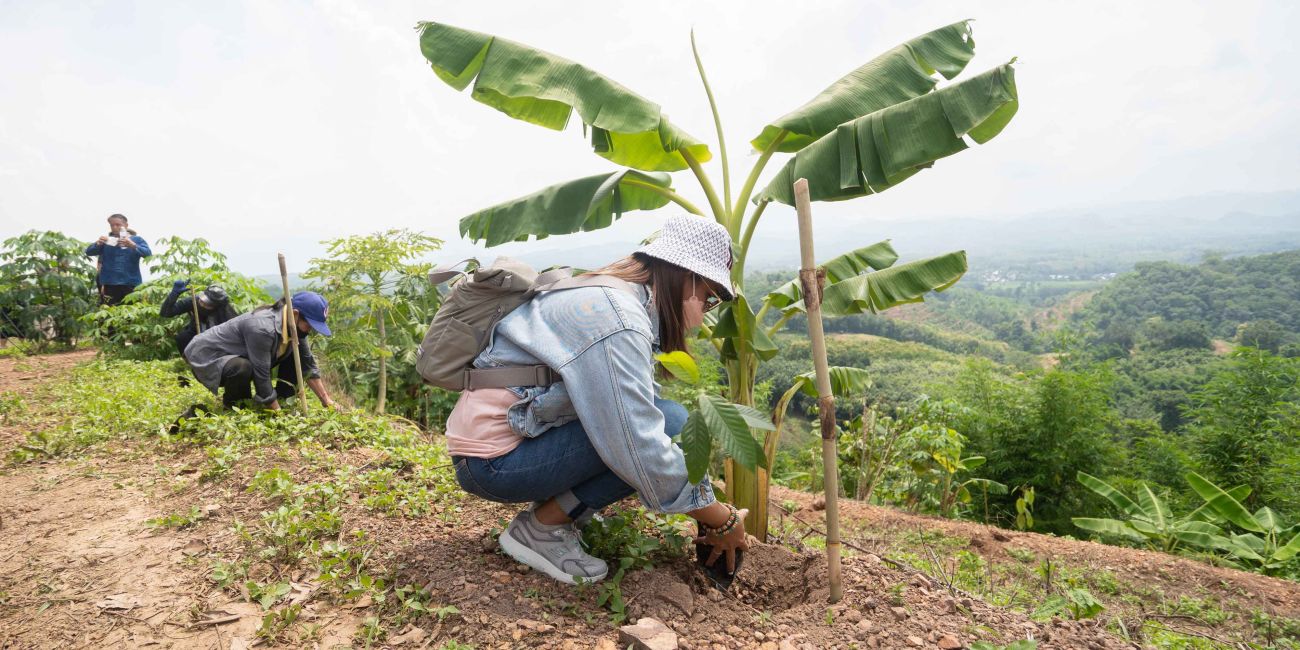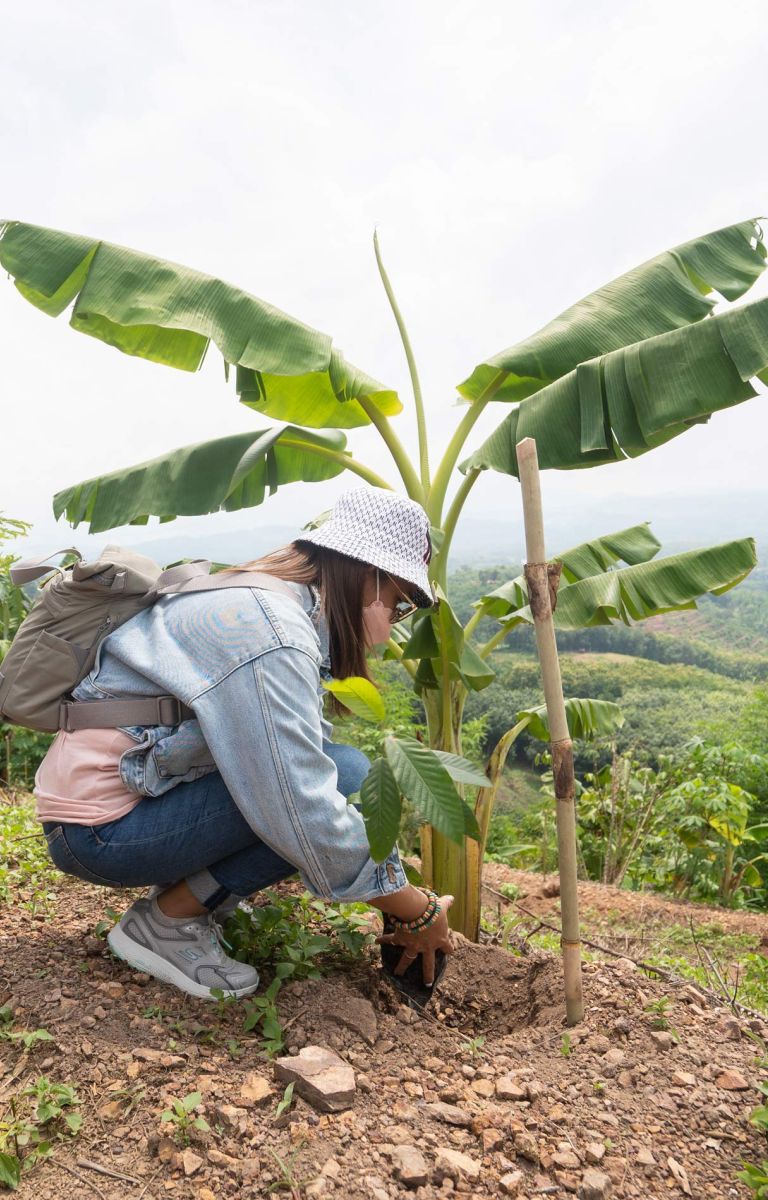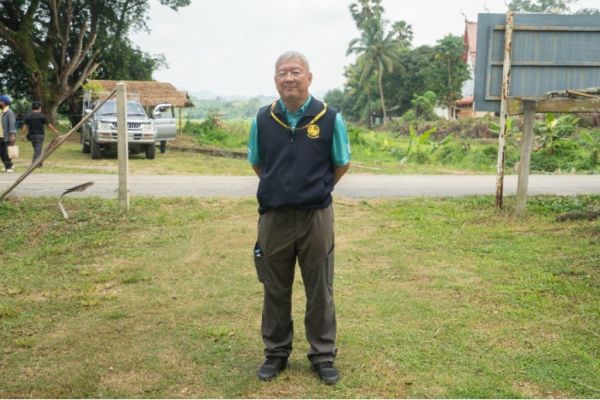

Atop a steep hill in Santisuk District of Nan Province, 26-year-old farmer Wararat Wutti is planting native tree species with a group of volunteers who have come a long way from Bangkok and other provinces.
Launched on 24 February 2022, Trees4All aims to restore forest landscapes in Santisuk District by closing a funding gap for smallholder farmers and engaging the private sector and the public in sponsoring tree planting.
Under Trees4All, a fundraising campaign has been created on the Thai crowdfunding platform taejai.com. The cost of participation starts at 100 Thai baht (US$3) for one tree. The campaign wants to raise 1 million Thai baht in donations (US$30,000) by 24 February 2023. The funds will be used to finance 100 smallholders to grow 100 native tree species on their farmlands.
In total, 10,000 trees of diverse species will be planted. These trees will help restore the ecosystem and generate alternative sources of income for farmers.
The Rak Santisuk Community Financial Institute will disburse the donated funds to participating farmers as installments over three years. Each farmer will receive total financial support of 6,000 Thai baht (US$170) to plant and tend their trees.
Wutti inherited the 3 hectares of land from her parents. For decades, her family grew monocultured maize. Monoculture means growing just one crop in an area of land. Ultimately, the growing of monocultured maize degraded the land. Severe drought and high temperatures induced by deforestation and climate change also caused fires that ravaged the farmland twice over the past few years.
Wutti thinks it’s time to bring fertility back to this land, not only for the sake of the environment but for her to generate income from it in a more sustainable way.
She decided to join Trees4All, which is a tree-planting initiative co-created and co-managed by the Rak Santisuk Community Financial Institute and RECOFTC.
Why Nan?
Located nearly 700 kilometres north of Thailand’s capital, Bangkok, Nan Province is home to a forest ecosystem of vital importance to the country’s largest watershed, the Chao Phraya River. Around 40 percent of water in the Chao Phraya comes from the Nan River.
But more than 160,000 hectares of forest in Nan have been degraded, primarily by the vast expansion of monoculture maize plantations over the past three decades. The massive loss of forests threatens the quantity and quality of water in the Nan and Chao Phraya rivers.
The government began to promote maize cultivation in the 1980s in light of rising demand and prices. The cash crop boom led to the conversion of vast forested areas into maize plantations. It also pushed farmers into a debt trap because of the fluctuating price of maize, the rising cost of farm inputs and unfair contract farming agreements.
Nan Deputy Governor Kritpetch Petcharaburanin believes that by planting native tree species in the monoculture plantations, Trees4All will help restore the ecosystem and improve farmers’ livelihoods.
“In the past, we followed the economic development path,” says Petcharaburanin. “From now on, Nan people will be the guardians of the Nan and Chao Phraya watersheds.”

The pioneers
The Trees4All is designed to support farmers who grow monocultures and have been granted land-use permits to live or cultivate in degraded forest and watershed areas. Permission includes a land document issued by the government’s National Land Policy Committee, known as Kor Tor Chor.
Following interviews with interested farmers and inspection of their farmlands, the first 17 farmers were selected by Trees4All to join the initiative. They had been growing maize, rubber, cacao and avocado as monocultures.
At the peak of the rainy season in August 2022, the farmers began planting native tree species on their farmlands where they had previously harvested their monocultured crops.
Some farmers chose to plant Dipterocarpaceae tree species, which create conditions for mushrooms to grow. Other farmers preferred herbal, native fruit and timber trees.
“I really want to make my farmland green again,” says Wutti, one of the first 17 farmers. "When the trees grow up, humidity will return, and there will be a lot of mushrooms, which can be sold at a high price.”

Siam Wongthet, 47, another participating farmer, says she always wanted to restore the land fertility and surrounding ecosystem but didn’t know how to start. “Trees4All helps me make the first step,” says Wongthet, who has cleared part of her maize plantation to plant Yang Na (Dipterocarpus alatus) and teak.

Warangkana Rattanarat, director of RECOFTC Thailand, says Trees4All creates a sense of tree ownership because farmers plant the trees and carefully and sustainably tend them to earn income.
Tree-planting sponsors can follow the growth of their trees via an online database that stores the tree registration, the geographic coordinates of the location and photos from the planting.
Collaborative model
Extensive collaboration of the government, the private sector, civil society and community organizations is a core strength of Trees4All.
Trees4All is hosted on the crowdfunding site for community-led social projects, taejai.com.
“We wanted to build a direct channel for companies and individuals to work together with communities,” said Sunit Shrestha, Change Fusion Managing Director, who founded Taejai. “The private sector and the public want assurance that communities have a clear way to measure the impact of work on forest preservation and restoration. Tree for All gives that assurance.”
The social enterprise ChangeFusion co-founded the crowdfunding platform taejai.com that hosts the Trees4All donation site where the public and private sector register donations to sponsor the tree-planting. The Rak Santisuk Community Financial Institute manages the donated funds. Local farmers plant and tend the trees. The Royal Forest Department provides technical and legal support. Tourism business operators in Nan help promote the Trees4All activities.
Multisector collaboration is essential to achieve the national target of increasing the tree-cover area to 55 percent by 2037, says Rattanarat of RECOFTC.
Forest plantation promotion expert Suwan Tangmitcharoen of the Royal Forest Department says Trees4All supports its mission to encourage sustainable use of degraded forest.
“Our work is based on a concept of coexistence between people and the forest,” he explains. “We are ready to support Trees4All and every project that involves restoration and sustainable use of land in degraded forest reserves.”

A Trees4All donor sings praise
As of August 2022, Trees4All had received more than US$9,800 in donations.
One of the major donors for Trees4All is the fan club of Thai singer Peck Palitchoke. Many of its members travelled to Santisuk District to join a ceremony to plant the first 100 trees under the Trees4All initiative on 30 July 2022.
“I live downstream on the Chao Phraya River,” says Thipsuda Nakthang, 36, a fan club member from Nonthaburi Province. “I am aware that it’s my duty too to help restore the watershed. By making donations to the Trees4All, I can contribute to forest restoration.”

Srithai Sirimoon, vice-chairman of the Rak Santisuk Community Financial Institute, stresses that the donated funds will be managed in a transparent and verifiable way by a committee comprising representatives of each Trees4All partner.
“We are glad to be part of the effort to revive the ecosystem in our district," says Sirimoon. "The Rak Santisuk Community Financial Institute is confident that the Trees4All initiative will benefit the people of Santisuk.”
###
This story was produced by RECOFTC's forest landscape restoration initiative FLOURISH with the financial support of the International Climate Initiative (IKI) of Germany’s Federal Ministry for the Environment, Nature Conservation, Nuclear Safety and Consumer Protection (BMUv). Its content is the sole responsibility of RECOFTC and does not necessarily reflect the views of BMUV. For more information on FLOURISH visit this page.
RECOFTC's work is made possible with the continuous support of the Swiss Agency for Development and Cooperation (SDC) and the Swedish International Development Cooperation Agency (Sida).


